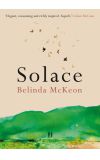
12 Sep 2011 02:03:54
Unsentimentality is one thing, the fear of being perceived as sentimental is another. That fear, almost inescapably ingrained in academic writing courses and programmes, scares some young writers away from learning how to express emotion at all. The central event of Belinda McKeon's novel is so brutally absolute, so great a bereavement in so brief a moment, that the author has set herself a task with which even Hardy might have found it difficult to deal. Direct, immediate approach to such monstrous pain by any of the characters is impossible, and thus some of the circuitousness of the narration – a scene from the middle of the story used as a prologue, omissions, leaps, recursions – which might appear mere trendy narrative technique, can be seen as legitimate fictional handling of a violent, unexpected, senseless catastrophe. In a sense, the narrator is imitating the way her surviving characters must come to deal with agony. She is dancing their dance, as it were. But does the reader, watching this cagey, shifty movement of evading the unbearable, feel involved in it?
To describe the story's central event would be to betray the author's care in foreshadowing and withholding information till past the middle of the book. I will therefore not discuss the plot further, but only the characters, to whom my response was in each case definite, though possibly quite different from the author's. Three viewpoint characters tell us the story: Mark, a graduate student writing a thesis on Maria Edgeworth at Trinity College, Dublin; his father Tom, a farmer; and Mark's girl Joanne, who in short order becomes the mother of their baby Aoife. Joanne is an ambitious, intelligent, unimaginative aide in a law firm; we are never given her thoughts on such important things as her relationship with her mother, even when she is visiting her mother on the farm next to Mark's father's farm. The main thing about Joanne is that she's still very young.
The same can be said for Mark. He left the country with relief, yet feels himself a farm boy, uneasy in his role as city intellectual; he has got himself into the familiar grad-student situation of not turning in the next chapter of his thesis, drifting along between beers, putting things off. And he gives litle promise of becoming anything else. He is callow and rather feeble. He drifts, he intends, he puts things off. He does, in a kind of fumbling, sleepwalking way, fulfil the one great responsibility that is handed him. Maybe he will grow up, but at the end of the book, though he's shown some evidence of character in the moral rather than the fictional sense, he's still callow. And still, though I don't like to say it, very dull.
His father, Tom, is not dull. Every time the book comes round to Tom, it comes alive. He's not in any way unusual: a hard-working, hardbitten, self-righteous farmer, of limited education and interests, completely unable to understand or get on with his son. But he has kindness, however inefficient, and he has vitality. You feel the life of the man. His kitchen rises up around him with a vividness lacking elsewhere in the book, his cattle are real cattle, even his tractor is a personality . . . And his attempts to talk with, or at, or to Mark are clearly heard and recorded, lurching between the painful and the ridiculous. What humour there is in this rather solemn novel is Tom's humour. The finest scene, to me, is one where Tom, floored by the tiny rage of a two-year-old baby, laughs and then finds himself crying – for all the awful grief suffered in the novel, the first and only tears.

